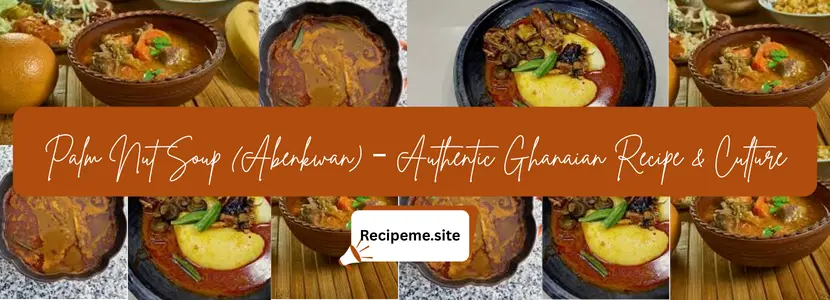
Introduction
Have you ever tasted a dish so rich, so comforting, that it instantly transported you to another place? That’s exactly what happens when you try Palm Nut Soup (Abenkwan).This beloved Ghanaian delicacy, made from creamy palm fruit extract, is more than just food—it’s a story of tradition, heritage, and family gatherings. For many Ghanaians, Abenkwan is not just soup; it’s a warm embrace on a rainy evening, a centerpiece at festive celebrations, and a taste of home no matter where they are in the world.
But what makes this soup so special, and why has it remained an iconic part of Ghanaian cuisine for generations? Let’s explore.
History of Palm Nut Soup (Abenkwan)
Palm nut soup has been a part of West African cuisine for centuries. In Ghana, it is known as Abenkwan among the Akan people, which literally translates to “palm nut soup.”
Historically, palm fruit was prized not only as food but also as a source of oil, medicine, and symbolism in cultural rituals. Families would gather to prepare this hearty soup during harvest festivals, weddings, and traditional ceremonies.
Over time, Abenkwan became a household staple, enjoyed across regions with unique variations. It is often paired with fufu, rice, or boiled yam—making it a versatile dish loved by all ages.
Did You Know? Palm nut soup is one of the few Ghanaian dishes enjoyed across nearly all ethnic groups, each adding its own twist to the recipe.
Essential Ingredients for Palm Nut Soup
The beauty of Abenkwan lies in its balance of richness and spice. To prepare an authentic version, these ingredients are essential:
-
Palm nut concentrate or fresh palm fruits – the star ingredient.
-
Protein – chicken, beef, goat, or fish (often smoked or dried).
-
Onions, garlic, and ginger – for the base flavor.
-
Tomatoes (fresh or paste) – for color and tang.
-
Pepper (scotch bonnet or chili) – for heat.
-
Spices (bay leaves, anise, or African calabash nutmeg) – for aroma.
-
Salt and seasoning cubes – to taste.
-
Garden eggs (optional) – traditional vegetable addition.
Pro Tip: Using smoked fish or dried fish adds a depth of flavor that makes your soup taste authentically Ghanaian.
Variations of Abenkwan
Across Ghana and West Africa, palm nut soup comes in delightful variations:
-
Light Palm Nut Soup – thinner consistency, popular in the coastal regions.
-
Thick Palm Nut Soup – creamier and richer, common in the Ashanti region.
-
Palm Nut Soup with Goat Meat – adds a robust, earthy flavor.
-
Palm Nut Soup with Smoked Fish – smoky and aromatic, often enjoyed with rice balls.
-
Vegetarian Palm Nut Soup – made without meat but enriched with mushrooms and garden eggs.
Preparation: Step-by-Step Guide
Here’s a simple way to prepare Ghana’s favorite Abenkwan at home.
Ingredients (serves 6–8):
-
1 can palm nut concentrate (or 2–3 cups boiled fresh palm fruits)
-
1 kg assorted meat (goat, chicken, beef, or fish)
-
1 large onion (chopped)
-
2 medium tomatoes (blended)
-
2 cloves garlic + 1 thumb ginger (blended)
-
2 scotch bonnet peppers (to taste)
-
2 garden eggs (optional)
-
2 tbsp tomato paste
-
1 tsp aniseed (optional)
-
Salt & seasoning cubes
-
6–8 cups water
Instructions:
-
Prepare the Base
-
Wash and season your meat with onion, garlic, ginger, and salt. Boil until tender.
-
-
Extract the Palm Nut
-
If using palm nut concentrate, dilute with water. If using fresh palm fruits, boil, pound, and strain to extract the juice.
-
-
Build the Soup
-
Add palm nut extract to the cooked meat stock. Stir in tomato paste, blended tomatoes, and spices.
-
-
Simmer and Infuse Flavors
-
Add garden eggs and peppers whole. Let the soup simmer for 45–60 minutes, stirring occasionally.
-
-
Finish and Serve
-
Adjust seasoning, remove garden eggs and peppers (blend and return if desired), and serve hot with your preferred side.
-
Did You Know? Traditionally, palm nut soup was stirred with wooden ladles over open fires, giving it a smoky undertone that modern kitchens often miss.
Cultural Significance of Palm Nut Soup
Palm nut soup isn’t just food—it’s a cultural heritage.
-
It is often served at funerals, weddings, and naming ceremonies, symbolizing warmth and hospitality.
-
In many Akan households, Sunday lunch is incomplete without a steaming bowl of Abenkwan and fufu.
-
Sharing the soup is a communal experience, often cooked in large pots for family and friends.
Serving Suggestions
Palm nut soup pairs beautifully with many Ghanaian staples:
-
Fufu – the classic combination.
-
Rice balls (Omo Tuo) – soft and smooth, perfect for soaking up the soup.
-
Boiled Yam or Plantain – hearty and filling.
-
Plain Rice – a lighter but equally delicious option.
Types of Palm Nut Soup
Though the base remains the same, there are subtle types depending on preparation:
-
Clear Palm Nut Soup – less tomato, more palm base.
-
Tomato-Rich Palm Nut Soup – thicker and brighter red.
-
Regional Variants – Ashanti (spicier and thicker) vs. Fante (lighter and fish-based).
Tips for the Perfect Palm Nut Soup
-
Use fresh palm fruit if available—it’s richer than canned concentrate.
-
Don’t rush the simmering process; slow cooking extracts deeper flavors.
-
Add protein gradually to avoid overcooking delicate fish.
-
Blend and return peppers for extra heat if you like it spicy.
-
Skim excess oil if you prefer a lighter version.
Other Valuable Insights
-
Nutritional Value: Palm nut soup is rich in vitamins A & E, healthy fats, and protein (depending on the meat).
-
Hidden Fact: In some Ghanaian communities, palm nut soup is believed to bring strength and vitality due to its richness.
-
Expert Tip: For authentic taste, add a touch of prekese (Aidan fruit)—a spice known for its sweet aroma and health benefits.
Personal Experience: My First Taste of Abenkwan
I first tasted palm nut soup in Kumasi during a family visit. The pot simmered slowly on the fire, releasing an aroma that drew everyone to the kitchen. When served with fufu, I was amazed at how the creamy soup complemented the chewy texture. It wasn’t just a meal—it was an introduction to Ghana’s warmth and generosity.
Now, whenever I make Abenkwan at home, I’m reminded of that first bowl and the laughter shared around the table.
Conclusion
Palm Nut Soup (Abenkwan) is more than just a dish—it’s a taste of Ghana’s soul. From its deep cultural roots to its rich and comforting flavor, it continues to unite families and communities. Whether enjoyed with fufu, rice balls, or yam, Abenkwan is proof that food is the language of love, heritage, and togetherness.
Frequently Asked Questions (FAQs)
1. What is Palm Nut Soup (Abenkwan) made of?
It’s made from palm nut extract, meat or fish, tomatoes, onions, and spices.
2. Is Palm Nut Soup healthy?
Yes, it’s rich in vitamins, antioxidants, and healthy fats, though moderation is advised due to its oil content.
3. What can I eat with Palm Nut Soup?
Common pairings include fufu, rice balls, yam, and plantains.
4. How long does Palm Nut Soup last?
It can last up to 3–4 days in the refrigerator and can also be frozen for longer storage.
5. Can Palm Nut Soup be made vegetarian?
Yes, by skipping the meat and adding mushrooms, garden eggs, and plant-based proteins.
6. Why does Palm Nut Soup sometimes taste bitter?
This happens if the palm nut extract isn’t properly strained or if it’s overcooked.
